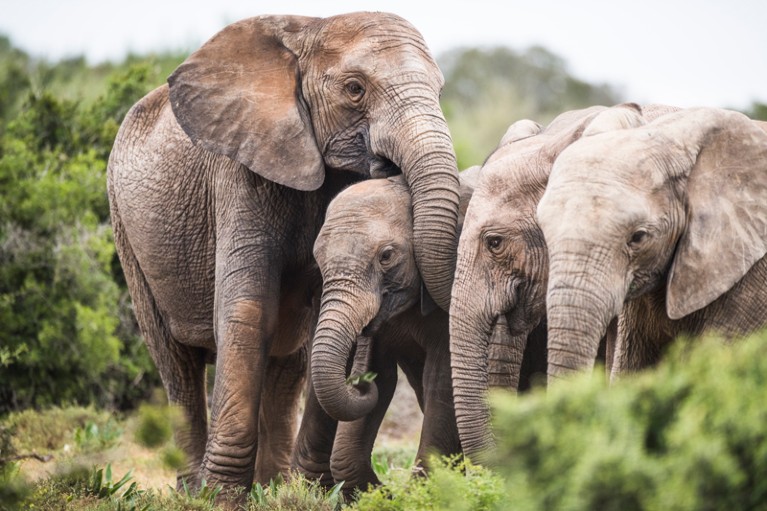Hello Nature readers, would you like to get this Briefing in your inbox free every day? Sign up here.

Elephants without tusks had an advantage in areas where ivory poaching was prevalent.Credit: Peter Chadwick/Getty
Hunting led to more tuskless elephants
In Mozambique, the selective poaching of elephants with tusks has led to a higher number of females being born without them. During the country’s civil war, from the late 1970s to early 1990s, hunting annihilated the African savanna elephant (Loxodonta africana) population in Gorongosa National Park. Before the war, about 18.5% of females born there were naturally tuskless — a trait that made them undesirable to poachers. Among the 91 female elephants that have been born since the war, that fraction has risen to 33%.
Mix-and-match COVID vaccines work well
For the first time, researchers have shown that regimens combining two different COVID-19 vaccines are highly effective at preventing the disease — and they protect against the Delta variant. The results fulfill hopeful expectations set by evidence of potent immune responses in people who received a mix-and-match regimen, with side effects no worse than those caused by standard regimens. “I was delighted to see that it’s as effective as one would expect,” says immunologist Martina Sester. “This is really good news and this will certainly have influence on clinical practice.”
Reference: Nature Medicine paper, The Lancet paper 1 & The Lancet paper 2
Nature readers’ climate fears
As the governments of almost 200 nations prepare for a pivotal United Nations climate conference, scientists have expressed their fears over global warming and lacklustre efforts to curb greenhouse-gas emissions. With just over a week to go until the 26th Conference of the Parties (COP26) in Glasgow, UK, 76% of the more than 650 readers who responded to a Nature survey said they were extremely worried about climate change. Nearly 60% say their worries have greatly increased since the last major climate accord, reached in Paris in 2015.
Features & opinion
Futures: science fiction from Nature
In this week’s helping of short stories for Nature’s Futures series:
• The appeal of uploading your consciousness to a machine evolves with age in ‘Byzantium’.
• A prisoner discovers the surprising source of a small taste of freedom in ‘Oceans like neurons’.
Five best science books this week
Andrew Robinson’s pick of the top five science books to read this week includes lessons from history on climate and pandemics.
Podcast: When Vikings lived in the Americas
Thanks to an ancient solar storm, researchers have identified a year when Vikings were definitely living in North America: exactly 1,000 years ago, in ad 1021. Scientists analysed the tree rings in wood used at the L'Anse aux Meadows settlement, the only confirmed Norse site in the Americas, in what is now Newfoundland, Canada. The telltale sign of atmospheric radiocarbon produced by a solar storm, known to have taken place in the year ad 992, allowed the researchers to exactly date when the wood was cut.
Nature Podcast | 35 min listen
Subscribe to the Nature Podcast on Apple Podcasts, Google Podcasts or Spotify.
